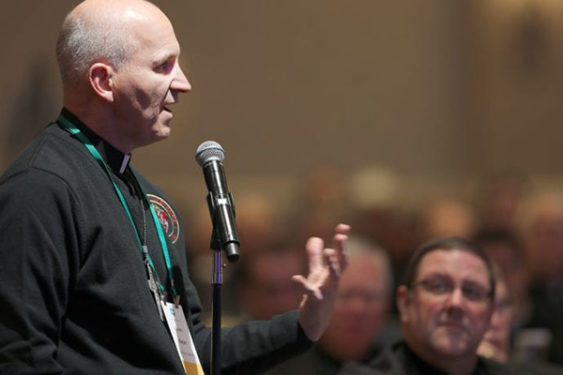
By Christopher White, The Tablet’s National Correspondent
BALTIMORE – At a time when the U.S. Catholic bishops are meeting to vote on new measures for bishop accountability, Pope Francis has given the green light for a penal process for a retired U.S. bishop accused of multiple accounts of abuse.
Bishop Steven Biegler of Cheyenne, Wyoming announced on Wednesday that the case of Bishop Joseph Hart, who led the diocese for nearly a quarter century, is now headed toward adjudication by the Vatican’s Congregation for the Doctrine of Faith (CDF).
The announcement was made as part of the diocese’s publication of the names of priests credibly accused of abuse. Hart is among the 11 priests included on the list.
In a column published on Wednesday, Bishop Biegler said “In the past, this information was kept confidential, and as a consequence, other children were harmed. Transparency helps prevent future abuse because it makes it almost impossible for those of us in church leadership to backslide on our promise of zero tolerance.”
“It is, we hope, a means of restoring trust with the laity. Credibility depends upon open and honest communication,” he continued.
In cases where a bishop is accused of abuse, a panel of five judges typically holds a canonical trial for the accused. Most recently, the Vatican has followed such a process with Archbishop Anthony Apuron of Guam and former cardinal and priest Theodore McCarrick, the disgraced former archbishop of Washington. While other canonical mechanisms could be utilized, a trial is most likely for a bishop.
Hart, who was ordained a priest in 1956 for the diocese of Kansas City-St. Joseph, is also under criminal investigation by Wyoming prosecutors since the state is one of the few in the country not to have a statute of limitations on criminal cases.
At age 87, Hart, who has denied allegations in both Cheyenne and Kansas City, continues to live in Wyoming. The Kansas diocese where he served has previously admitted to at least ten cases of settlements with his victims.
His case first reached the CDF in 2010 when Bishop Paul Etienne asked for them to open an investigation soon after he was named bishop of the diocese. When Bishop Biegler was named to succeed Etienne in 2017, he was briefed on the case and in July 2018, he announced that the diocese had completed its own investigation into Hart and found the allegations against him to be credible. Since then, new victims have come forward and their cases are being investigated both by civil authorities and Church officials.
As the bishops meet in Baltimore this week, among the proposals they are considering will be a “Protocol Regarding Available Non-Penal Restrictions on Bishops,” which outlines new accountability measures for emeriti bishops who have resigned or been removed from office due to “grave acts of commission or omission.”
The document invests the diocesan bishop with the ability to restrict the bishop emeritus’s ministry within the local church, as has already been done with Hart, and to make requests of the Holy See for a broader prohibition of his ministry. In addition, the document notes that the USCCB President, in consultation with the Administrative Committee, can request for such bishops to no longer attend USCCB meetings. Until recently, Hart has been a regular attendee of such meetings.
A vote on the proposed guidelines is scheduled for Thursday.
At the start of the Vatican’s February summit on sex abuse, which brought together the presidents of every bishops’ conference around the globe, Bishop Accountability, the leading U.S. organization dedicated to documenting the clergy abuse crisis, included Hart in their list of names of five prelates they believed should face the same fate as McCarrick.
At a press conference outside of St. Peter’s Square in Rome, Bishop Accountability Co-President Anne Barrett Doyle cited Bishop Biegler’s refusal to allow Hart to attend his installation Mass in 2017, one of his first acts as bishop of the diocese.
“This is what fraternal correction looks like,” she said, adding that she hoped Bishop Biegler’s handling of the case would offer a model for other bishops to follow.
